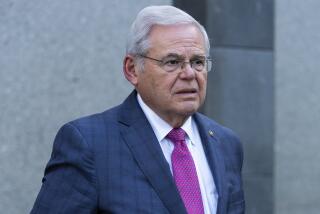Sen. Graham Will Not Seek Fourth Term
- Share via
MIAMI — Less than a month after abandoning his Democratic presidential bid, Sen. Bob Graham, one of Florida’s most popular and durable politicians, announced Monday that he would not seek reelection, dealing yet another blow to Democrats’ hopes to retake the Senate in 2004.
“I have had a full, joyful and -- I hope -- productive life,” said Graham, who also served two terms as Florida’s governor. “And I hope to have other chapters that will meet those same standards.”
Graham made the announcement at a news conference in Tallahassee, the state capital, where he spent the day helping repair the roof and track at a high school.
Such workdays -- Monday was his 391st -- have been Graham’s trademark method of staying close to voters and their concerns for more than a quarter century.
The retirement of Florida’s senior three-term senator, who turns 67 Sunday, will be a political earthquake in the Sunshine State, said Susan MacManus, a professor of political science at the University of South Florida in Tampa. “The Democrats will do anything to keep from losing this seat,” she said.
Graham becomes the fourth Democratic member of the Senate from the South to announce his retirement, following John Edwards of North Carolina, who is running for president; Ernest F. Hollings of South Carolina; and Zell Miller of Georgia. John B. Breaux of Louisiana is also considering an exit and has said he will announce his intentions on a possible fourth term later this month.
Florida has had only three Republican senators since Reconstruction, but Graham’s departure will magnify the challenges for Democrats in a region where the GOP has been making inroads for years.
It also increases the odds that Republicans, who hold a 51-48 majority in the Senate, not counting an independent from Vermont who votes with the Democrats, will maintain or strengthen their majority in next year’s election.
Florida’s two Senate seats are the highest offices held by Democrats in a politically important state otherwise dominated by Republicans, including Gov. Jeb Bush, the president’s brother. “The South will be fertile territory for Republicans this cycle, and Florida is another excellent opportunity for us,” Sen. George Allen (R-Va.), chairman of the National Republican Senatorial Committee, said in a statement.
In January, Graham underwent major heart surgery, then entered the crowded field seeking the Democratic presidential nomination.
Habitually calm and measured, Graham, who served last year as chairman of the Senate Intelligence Committee, surprised many with campaign rhetoric suggesting a “Nixonian” cover-up by the White House of the true reasons for the war with Iraq. He also came close to calling for the impeachment of President Bush.
However, polls in New Hampshire, Iowa and other states showed Graham’s candidacy failed to inspire voters. On Oct. 6, he became the first Democratic contender to drop out, declaring, “I have made the judgment that I cannot be elected president of the United States.” Graham said he would also ponder whether to seek a fourth Senate term.
Paul Anderson, the senator’s communications director, said Graham had sought the counsel of his party peers in the Senate, including Sen. Jon Corzine of New Jersey, chair of the Democratic Senatorial Campaign Committee.
Graham, who has four daughters, also met with each of them and their families to discuss the future.
Democrats were hoping that Graham would seek a fourth term to help their party avoid what will now likely be a hugely expensive campaign to hang onto his seat in a state that will be heavily targeted by the Bush presidential campaign.
Florida’s first-term Democratic Sen. Bill Nelson told reporters Monday in a conference call that he had been among those trying to persuade Graham to stay on.
“I’ve gone to Bob with a twinkle in my eye and a smile on my lips and said, ‘Bob, I would love to continue to be the junior senator from Florida,’ ” Nelson said.
Such appeals to Graham from colleagues in the Democratic Party were evidently for naught.
“This weekend he made the final decision,” Anderson said.
“In the final analysis, it is as much, or more, a personal decision as a political one.... He wanted to make a decision as to what he should be doing with the next phase of his life.”
As a private citizen, Graham said he would focus on expanding job opportunities for Americans, enhancing national security by applying what he has learned about military intelligence, and making Florida a center for environmental protection and the “capital of the Americas.”
The courtly, mannered politician from Miami Lakes, who became known for recording the daily minutiae of his life in notebooks, said he also wants to write, teach and possibly create an academic center to train a new generation of leaders for Florida.
The son of a dairy farmer and cattleman, Graham has held elective office since 1967, when he won a seat in the Florida House of Representatives.
“This has been a very difficult decision for me and my family, and I know for some of you it is a disappointment,” Graham said at the news conference, with his wife, Adele, and well-wishers at his side.
Later, in an interview with CNN, Graham said he was confident that his party could retain the seat.
So far, five Democrats, including U.S. Reps. Alcee L. Hastings and Peter Deutsch, and Miami-Dade County Mayor Alex Penelas, have declared their candidacies for the Senate, although they vowed not to challenge Graham if he sought reelection.
Dahlburg reported from Miami, Anderson from Washington.
More to Read
Get the L.A. Times Politics newsletter
Deeply reported insights into legislation, politics and policy from Sacramento, Washington and beyond. In your inbox twice per week.
You may occasionally receive promotional content from the Los Angeles Times.








